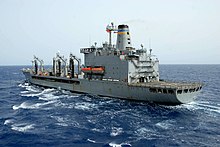 USNS Pecos (T-AO-197) USNS Pecos (T-AO-197)
| |
| History | |
|---|---|
| Name | USNS Pecos |
| Namesake | The Pecos River in New Mexico and Texas |
| Ordered | 12 February 1987 |
| Builder | Avondale Shipyard, Inc., New Orleans, Louisiana |
| Laid down | 17 February 1988 |
| Launched | 23 September 1989 |
| In service | 6 July 1990-present |
| Identification |
|
| Honors and awards |
|
| Status | In active Military Sealift Command service |
| General characteristics | |
| Class and type | Henry J. Kaiser-class replenishment oiler |
| Type | Fleet replenishment oiler |
| Tonnage | 31,200 deadweight tons |
| Displacement |
|
| Length | 677 ft (206 m) |
| Beam | 97 ft 5 in (29.69 m) |
| Draft | 35 ft (11 m) maximum |
| Installed power |
|
| Propulsion | Two medium-speed Colt-Pielstick PC4-2/2 10V-570 diesel engines, two shafts, controllable-pitch propellers |
| Speed | 20 knots (37 km/h; 23 mph) |
| Capacity |
|
| Complement | approx. 88 (18 civilian officers, 1 U.S. Navy Chief Petty Officer, 64 merchant mariners, ~5 U.S. Navy enlisted personnel) |
| Armament |
|
| Aircraft carried | None |
| Aviation facilities | Helicopter landing platform |
| Notes |
|
USNS Pecos (T-AO-197) is a Henry J. Kaiser-class underway replenishment oiler operated by the Military Sealift Command to support ships of the United States Navy, and the third such ship to be named after the Pecos River.
Pecos, the eleventh Henry J. Kaiser-class ship, was laid down on 17 February 1988 at Avondale Shipyards in New Orleans, Louisiana, and launched on 23 September 1989. She was delivered to the Navy and placed in non-commissioned service with a primarily civilian crew under the control of the Military Sealift Command on 6 July 1990. The ship is equipped with a helicopter platform to allow for at-sea transfer of personnel and supplies.
Pecos is part of the MSC Naval Auxiliary Force, MSC Pacific, in the United States Pacific Fleet, and has received the National Defense Service Medal, the Armed Forces Expeditionary Medal twice, and the Southwest Asia Service Medal.
History
In May 1994, Pecos collided with USS Reuben James during a replenishment operation in the Persian Gulf.
On 9 December 1999 a United States Marine Corps CH-46 Sea Knight helicopter crashed into Pecos and sank while participating in a training mission. Seven of the 18 personnel on board the helicopter were killed in the accident.
During Operation Tomodachi, Pecos rendezvoused with United States Seventh Fleet flagship USS Blue Ridge near Kyushu, Japan. Blue Ridge transferred 96 pallets of humanitarian assistance and disaster relief material to Pecos for delivery to the Essex Amphibious Group and Carrier Strike Group 5. Weighing as much as 1,000 pounds (450 kg) each, the pallets contained water containers and water purification tablets, first-aid products, tarpaulins, blankets, and other supplies. The ship arrived off Sendai on 25 March for more underway replenishment operations. During her support effort to Operation Tomodachi, Pecos completed nine underway replenishments and delivered more than 2.3 million U.S. gallons (8.7 million liters) of fuel to other supporting ships. Pecos helped refuel USS Harry S. Truman and HMS Defender in 2016.

On 28 November 2018, the United States Navy sent Pecos and USS Stockdale through the Taiwan Strait as a demonstration of the "U.S. commitment to a free and open Indo-Pacific," according to a U.S. Pacific Fleet spokesman. The transit took place only a few days before a planned meeting between U.S. President Donald Trump and Chinese Communist Party leader Xi Jinping at the G20 summit in Buenos Aires, Argentina.
Fate
On 9 October 2024, Pecos departed from San Diego enroute to be deactivated and taken out of service on the US East Coast.
References
- "U.S. Navy Collision in Persian Gulf". Chicago Tribune. 4 May 1994. Retrieved 12 October 2024.
- AP (17 December 1999). "Survivors recount deadly Marine copter crash". Sun Journal. Lewiston, ME. p. B6.
- "Search intensifies for 7 Marines after helicopter crash". CNN. Archived from the original on 2010-03-10. Retrieved February 27, 2007.
- "Sealift -- Operation Tomodachi...Friends to the rescue". Archived from the original on 2013-02-24. Retrieved 2011-10-08.
- "Navy News".
- Pickrell, Ryan (28 November 2018). "US Navy warships just rocked the Taiwan Strait in a power play ahead of Trump's meeting with the Chinese president". businessinsider.com. Business Insider. Retrieved 29 November 2018.
- Sabga, Patricia (29 November 2018). "Breakthrough, escalation or pause? Trump, Xi set to meet at G20". aljazeera.com. Al Jazeera. Retrieved 29 November 2018.
- Cannon, Sarah (9 October 2024). "MSCPAC Bids Farewell to USNS Pecos". United States Navy. Retrieved 10 October 2024.
 This article incorporates text from the public domain Dictionary of American Naval Fighting Ships.
This article incorporates text from the public domain Dictionary of American Naval Fighting Ships. This article includes information collected from the Naval Vessel Register, which, as a U.S. government publication, is in the public domain. The entry can be found here.
This article includes information collected from the Naval Vessel Register, which, as a U.S. government publication, is in the public domain. The entry can be found here.
External links
- "USNS Pecos (T-AO-197)". NavSource.org.
- "USNS Pecos (T-AO 197)". Navysite.de.
- Footage from YouTube of the CH-46 accident on 9 DEC 1999.
- Wildenberg, Thomas (1996). Gray Steel and Black Oil: Fast Tankers and Replenishment at Sea in the U.S. Navy, 1912-1995. Annapolis, Maryland: Naval Institute Press. Retrieved 2009-04-28.
| Henry J. Kaiser-class replenishment oilers | |||||
|---|---|---|---|---|---|
| |||||
| |||||
| Shipwrecks and maritime incidents in 1999 | |
|---|---|
| Shipwrecks |
|
| Other incidents |
|
| 1998 | |